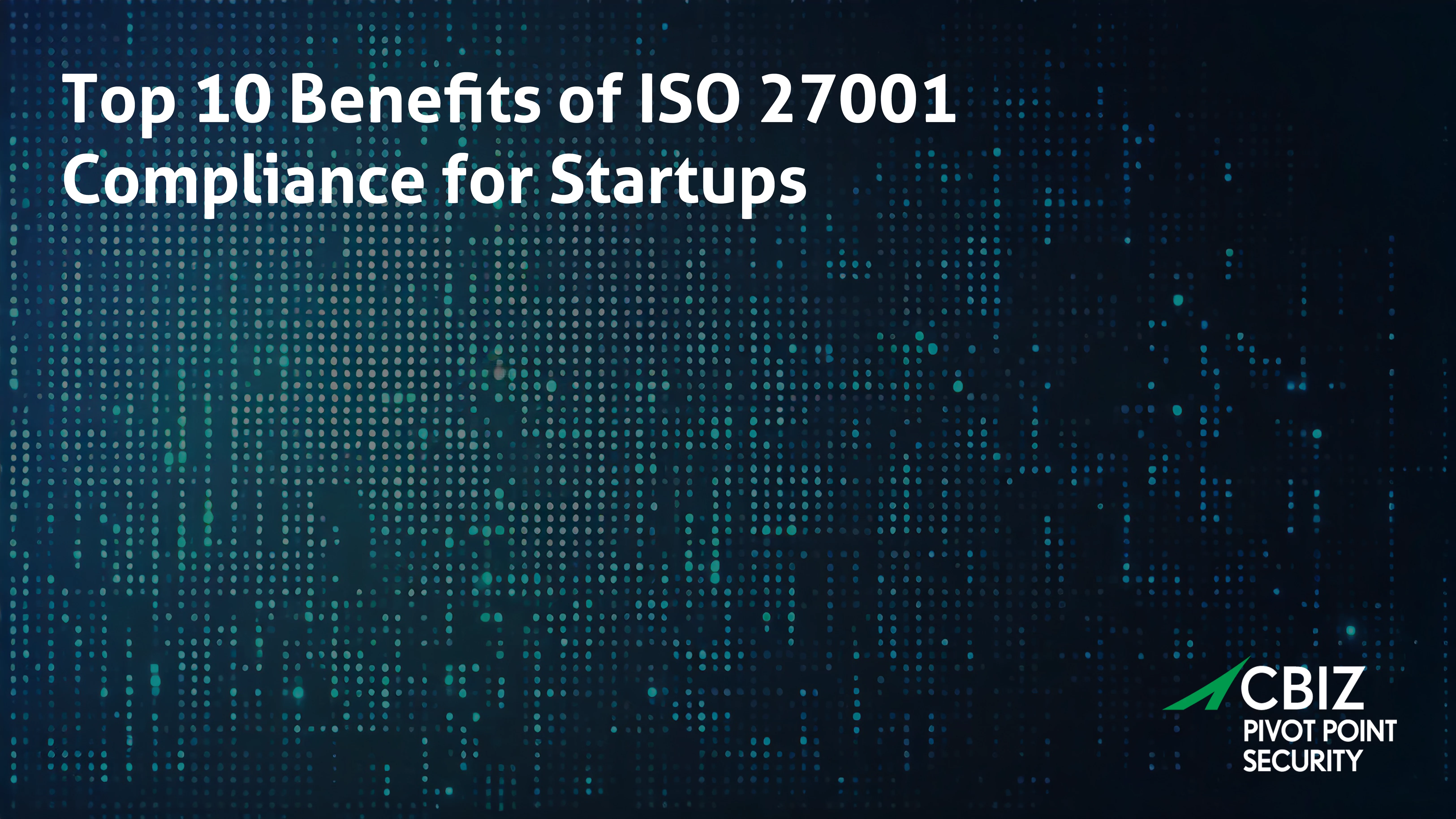Last Updated on February 13, 2025
Many startups compromise cybersecurity in the name of limited resources and too many competing priorities. But the financial and reputational risks associated with weak security make a startup unappealing to investors, partners, and prospects.
How can startups develop and demonstrate strong cybersecurity that delivers competitive advantage and doesn’t undermine business goals?
This post suggests 10 reasons for startups to consider getting an ISO 27001 certification.
What is ISO 27001?
Globally accepted and requiring a compliance attestation from an accredited third party, ISO 27001 is considered the “gold standard” among cybersecurity certifications.
The ISO 27001 framework enables organizations of any size or industry to manage information security risk comprehensively and cost-effectively. It describes controls and best practices for designing, operationalizing, and managing a robust information security management system (ISMS) that is integrated with business processes and supports business goals.
Unlike more prescriptive cybersecurity standards, ISO 27001 does not require all organizations to implement the same set of controls. Instead, it supports each business to develop a cybersecurity program aligned with its unique risk profile and rationale for mitigating, transferring, or accepting cyber risks.
Which startups benefit most from ISO 27001 compliance?
ISO 27001 has advantages for almost any company. It is most valuable for organizations that:
- Handle sensitive data, especially on behalf of customers and business partners
- Operate internationally or seek to build a global reputation
- Face customer demands, regulatory requirements, investor scrutiny, or other drivers to strengthen their cybersecurity
The top reason for pursuing ISO 27001 compliance is that customers and prospects are asking for it specifically or want compelling proof of your security capabilities.
Why should startups invest in ISO 27001?
The benefits of a robust cybersecurity posture are undeniable for any organization. But startups often face unique challenges around resource constraints, the ability to “pivot,” and an overarching requirement to minimize time to market.
In this context, enforcing cybersecurity is often seen as a hindrance. But ISO 27001 certification, when approached pragmatically, can support rather than compete with a startup’s business goals.
Following are 10 reasons why startups should consider investing in ISO 27001 certification.
#1: Reduced cybersecurity risk
ISO 27001 supports startups to systematically adopt a practical, proactive approach to cyber risk management. By assessing and prioritizing risks and implementing corresponding controls, ISO 27001’s structured approach can greatly reduce the probability and impacts of data breaches and other cyber incidents. By emphasizing incident response and business continuity planning, ISO 27001 compliance also helps ensure that a startup can better handle not just cyberattacks, but also natural disasters and other business disruptions.
#2: Stronger stakeholder trust
As the leading international standard for provable information security and compliance, ISO 27001 builds trust with customers, investors, business partners, regulators, auditors, top management, and the public. An ISO 27001 certification demonstrates a startup’s commitment to keeping sensitive data secure and developing mature business processes. ISO 27001 also encourages organizations to be transparent about security and privacy so that customers and others can understand why and how their data is used and protected.
#3: Meet the cybersecurity requirements of top-tier clients and partners
The largest and most successful enterprises rely on policies and procedures to maintain their standard of excellence. Many startups face hurdles and delays doing business with big companies because their immature cybersecurity is a supply chain risk and/or a regulatory compliance issue. An ISO 27001 certification turns that situation around and makes your startup a competitive standout in the eyes of market leaders.
#4: Attract investors and enhance your business valuation
The ability to prove you can keep sensitive data secure can facilitate investment deals. ISO 27001 compliance shows you’re covering cyber risk and investing in long-term success. By extension, this makes your company more valuable because investors won’t have to use their money to fix your cybersecurity.
#5: Gain more business globally
Thanks to the internet, startups have an expanded potential to access global markets and participate in multinational supply chains. But with this global opportunity comes greater cybersecurity risk and scrutiny. Because it is respected worldwide, ISO 27001 can elevate your startup above international competitors that haven’t invested in cybersecurity.
#6: Achieve and sustain regulatory compliance
ISO 27001 compliance also ensures compliance with many industry-specific regulations like HIPAA and Sarbanes-Oxley (SOX), as well as privacy laws. Startups operating in regulated industries can leverage their ISO 27001 compliant ISMS to achieve, maintain, and show compliance with many of these requirements.
#7: Improve operational efficiency
ISO 27001 certification requires organizations to evaluate and improve many of their internal processes. This creates new operational efficiencies, automates workflows, and ensures effective management of data assets. The result is often operational cost savings, faster processes, and greater ease of doing business.
#8: Continuously improve your cybersecurity in the face of escalating threats
The cyber threat landscape is becoming more perilous by the day. A core ISO 27001 tenet is demonstrating continuous improvement of your cybersecurity posture to maintain your certification. By constantly evaluating and enhancing their security controls to keep pace with evolving cyber threats, ISO 27001 certified startups can continuously reduce their risk exposure—including the escalating costs of a data breach.
#9: Attract the talent you need to succeed
In today’s cybersecurity talent marketplace, demand radically exceeds supply. To attract and retain talented people, it’s beneficial for your business to provide a secure and stable work environment. ISO 27001 compliance sets your startup apart as taking security seriously and demonstrating stability and process maturity. This makes your business more impressive and appealing to potential employees.
#10: Position your business for long-term success
Investing in ISO 27001 compliance is a strategic decision whose benefits accrue and compound over time. Weighed against the potentially devastating costs of risks and threats manifesting as a data breach or other cyber incident, the cost of ISO 27001 compliance is nominal—never mind all its financial, regulatory, and reputational advantages.
What’s next?
An ISO 27001 certification inspires stakeholder confidence, helps land major clients, and lays a foundation for sustainable growth. But how you approach your ISO 27001 certification process can make all the difference in a startup environment.
For example, startups need to identify and protect their most critical assets first, while approaching ISO 27001 compliance as a phased, resource-efficient effort. Rather than constraining the organization, ISO 27001 can be an enabler for agility and innovation.
To speak with an expert on your unique business scenario and ideas for your ISO 27001 roadmap, contact CBIZ Pivot Point Security.






















